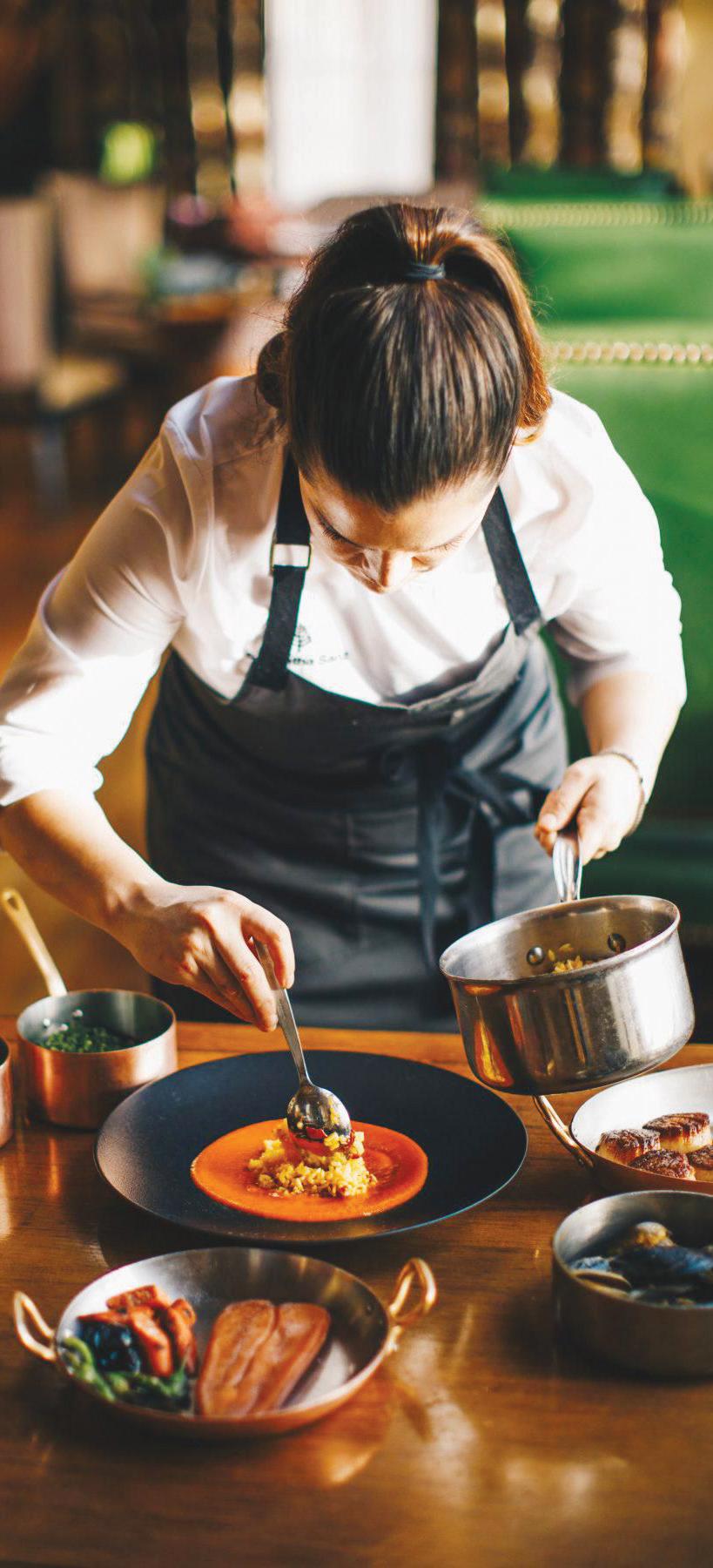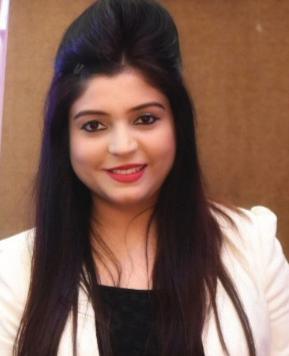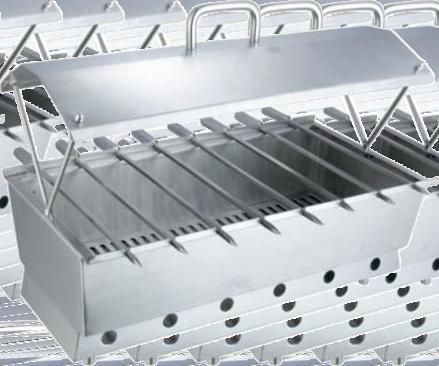
19 minute read
COVER STORY
Women Cooking up a Storm?
The term ‘Women in kitchen’ is attaining new meaning today. From women in the kitchens at home to women chefs in the F&B outlets in hospitality industry they have steadfastly, despite several handicaps, made a solid and sturdy progress. The result is that today women in India are ruling the roost in several F&B kitchens. But the ratio to male chefs is still negligible as compared to the U.S. where, according to the National Restaurant Association, over 60% of American women have worked in the restaurant industry at some point in their life. As women entrepreneurs and achievers break glass ceilings in every field in India, Ashok Malkani raises a toast, on this International Women’s Day, to those who have carved a name for themselves in the hospitality industry – particularly in the F&B segment – and examines the role, opportunities and prospects of female chefs in India.
Advertisement
While a woman is considered to be the kitchen queen at home she seems to have not yet been able to make an impressionable dent in the male dominated kitchens of the F&B segment of hospitality industry. As the world celebrates International Women’s Day it is a sad commentary that while women have carved a niche for themselves in several industries they have yet to acquire a dominant position in the hospitality industry in India, particularly the F&B segment which is supposed to be their forte. The UN Theme for International Women’s day 2021 is “Women in Leadership: Achieving an equal
future in a COVID-19 world”. While women empowerment might be prevalent in a few industries it seems to have been negligible in the hospitality sector.
There are, of course a few women like the late Tarla Dalal, who had bagged a number of awards for her expert culinary skills. Her over 100 cookbooks have kept her world famous recipes alive and are cooked extensively in Indian homes.
Women have to aggressively push forward to gain a status in the F&B industry. To close the gender gap in the F&B kitchens, between the male and female chefs, today’s women have to take the reins and be the torchbearers.
Speaking about women and employment, in general, it may be mentioned that though women account for over 58% of the world population, less than 30% occupy top executive positions in various fields. Only 21.7% of enterprises, all over the globe, reported that their CEO was a woman. According to Global Entrepreneurship Monitor (a research consortium dedicated to understanding the relationship between entrepreneurship and national economic development) the Total Entrepreneurial Activity (TEA) for women, globally, is 10.2%, about three-quarters of that seen for men.
According to Kasanita Seruvatu (former Director of Training in the Fijian ... Gender
Equality at the Heart of Decent Work Campaign 2008-09), there is a patriarchal attitude towards women in the world of work and sometimes women are given token positions to pacify the strong advocates in women issues and to more or less ‘keep their mouths shut’.
Women definitely have to struggle hard to find a rightful place particularly in the hospitality industry and the F&B sector.
Take the case of Ashika D’Souza, Assistant F&B Manager, ITC Windsor, Bengaluru. She says, she has succeeded because “My passion for hospitality and relentless curiosity for the profession enabled me to constantly innovate the way I approach my daily operations. As a woman, a strong mindset and a desire to utilize the strength in skill, knowledge and experience keeps me motivated. With both men and the women bringing different skill-sets to the table, it only paves way for diversity at the workplace.”
She adds, “Wearing many hats is often a regular occurrence in a woman’s life; what with balancing careers, households among other things. However,” she admits, “the trend and culture in our industry is changing drastically, and many more females are being empowered to come forward and make a mark. I truly believe women make phenomenal leaders because they are experts at making the impossible
seem possible. And sometimes on a good day they even make it look effortless. “
There can be no doubt that women have to constantly prove their mettle. This is all the more prominent in the F&B segment.
There are several reasons that F&B professionals attribute for preference of males in the kitchens.
As Neeraj Rawoot, Executive Chef – Sofitel Mumbai BKC explains, “Even in today’s day and age, we still all expect women to take care of the home, bring up children and cook for the family. So, in my opinion, for a working woman it becomes slightly challenging to balance her work

and personal life. It becomes even more difficult if your work demands longs hours. A professional kitchen is one such place, where you have a substantial commitment on time and energy, because you cater to five meal periods a day – breakfast, lunch, high-tea, dinner and supper. It takes a lot of you actually. Hence, it becomes very challenging for women to run between the two – her job and her house – and probably, that’s the reason why we see less women in this field and more testosterone driven kitchens. At Sofitel Mumbai BKC however, we encourage our teams and women in particular, to maintain a healthy work-life balance. No extended hours and overtime at work is promoted and we try to ensure that they are able to manage their professional and personal time effectively.”
Kamlesh Salve, Executive Chef, The Mirador Mumbai states, “Historically, women have always done the cooking at home but that has been seen as domestic and not a 'real' job. Most restaurateurs are more likely to hire a young man because they can run around the kitchen faster with heavy pans and create more business. Men have greater muscle power, yet women are calmer in the kitchen. The real crisis in the industry unfortunately falls upon reputation. As a society we suffer from a conflict that it is reputable for women to have culinary aptitude, but when it comes to them pursuing a professional career in such talent, the general consensus drops dramatically. There is a notion that has been historically ingrained in our culture - established by both culinary professionals and diners alike - that the industry is male-dominated for a reason. There are those who think that men possess the skills, aptitude and resilience to survive the pressures and hardship of a professional kitchen, that women do not.”
Chef Vanshika Bhatia, of ‘Together at 12th’ Restaurant at the Le Meridian Gurgaon, reveals, “F&B is a predominantly Male dominated industry and historically the reasons for that have been manifold- for instance, late hours, highly physical work and high paced, heated environment, just to name a few.”
However presenting the other side of the coin she says, “Women have always been the Masters of the Home Kitchen and modern chefs are breaking the above misconceptions of Women not being able to take on the pressures of the commercial kitchens, every single day. These are the
Neeraj Rawoot

chefs that are paving the way for other Young Women who want to be a part of the Industry. Since the gap has been so wide, it will definitely take some time to close it but the trend of women working in commercial kitchens is going upwards steadily.”
She is sure about the continuing rise of women in the F&B kitchens, narrates her rise in the industry as an example. She states, “I myself was the Head Chef of Ek Bar in Delhi at the age of 23.” She continues, “I started my culinary journey right after class 12th when I joined Le Cordon Bleu London. I immediately jumped into working and spent time in the kitchens of the best restaurants in the world like Noma Copenhagen, Gaggan, Thailand and Junoon, Dubai before I decided to come back home to India. I then worked at Olive Delhi post where I was made Head Chef of Ek Bar, one of the many restaurants under the Olive Umbrella. It was just post this that I decided I want to run my own kitchen because I had a lot of stories I wanted to tell through food and I wanted the freedom to be able to do it. At the age of 25, I opened ‘Together at 12th’’ in Le Meridien Gurgaon.”
Ruby Islam, Pastry Chef, ITC Windsor, Bengaluru, avers, “The notion of fewer females in the kitchens is a changing one, with more women coming forward to challenge the status quo. Today, a large number of women run owned-businesses and manage luxury hotel kitchens.”
Citing her own example, she narrates her journey through her career thus:
“Having pursued my Bachelors of Hotel Management at Christ University, Bengaluru, I joined the KMT Program with ITC Hotels in 2013. I specialized in Bakery & Pastry after having worked in the kitchens of Taj Mahal Palace, Mumbai as a trainee. During my KMT days, I worked at the ITC Maurya, New Delhi, and subsequently was part of the pre-opening team at ITC Grand Bharat. My first stint as a Jr Sous Chef was at the ITC Gardenia in pastry under the leadership of Chef Arvind Prasad. With Chocolate being our newest venture- ITC Hotels & FBD launched Fabelle- Exquisite Chocolates and I headed the first boutique at the ITC Gardenia, following which I standardized opening the brand across the chain.
“Prior to my current posting as the Pastry Chef at the ITC Windsor and heading bakery, pastry and Fabelle, I was also part of the kitchens of ITC Sonar, Kolkata, where I worked as the Sous Chef- Bakery, Pastry & Fabelle.”
Rimzim Singh, HR Manager at Hotel Crowne Plaza New Delhi Rohini asserts that in the present day industry females are increasingly being employed as chefs and F&B professionals in the hospitality industry. She adds, “Media has played an important role in glamorizing a chef’s life and their passion to work in kitchen. Female chefs have brought in a new energy to professional kitchens and they are running the restaurants successfully. It will take time but soon we will see women and men ratio same in F&B and culinary field.”

Kamlesh Salve
Kitchen Queens
It seems that sexist gender roles continue to dictate that the kitchen and home are the workplace of the woman, and the outside world – and its kitchens – the workplace of men. Very few women have thus made it as chefs in the kitchens of high-end Indian restaurants and cafés.
If one steps into the shoes of a female culinary student one finds that they have spent hours studying tirelessly to achieve





Rimzim Singh

Vanshika Bhatia

Ruby Islam
their dreams. They toil in the kitchen to carve their own niche. After this, imagine them being told that they are not as good as the male chefs!
They are treated as second fiddles in F&B outlet kitchens. Isn’t it time they took the reins in their hands and demanded an equal – if not superior – role in the kitchens as their male counterparts?
Neeraj believes that women can definitely be excellent leaders in the restaurant kitchens. He states, “I strongly believe that women can become excellent leaders in professional kitchens and there are some well-known examples of outstanding women head chefs in our own country – although the numbers are not large, but they are very promising. It is essential that women, in whatever capacity or job role, are respected, made to feel safe and given the opportunity to work shoulder-to-shoulder with the men in the kitchens. That is what’s required to bring in more women hands in our professional kitchens.”
Rimzim says that women’s versatility makes it all the more important for them to be treated on equal footing as male chefs, particularly at a time when COVID 19 is having an adverse impact on all aspects of life. She avers, “A woman’s inclination towards kitchen and versatile knowledge and experience in the said field should itself act as a self-motivation to drive her to a leadership role. Additionally hospitality industry has left no stone unturned towards gender diversity, especially when it comes to advanced employment opportunities for females in various departments. IHG itself has career progression program for High Potential Lady Colleagues like “Climb, Lead and Rise for Elevated roles at managerial level and HOD level.”
She opines that there are lower number of female chefs as “it involves a lot of physical hard work with long hours of working. However this has eventually changed with latest machines and equipment which has replaced physical work load and organizations are now really focused for work life balance and vacations paid offs.”
Kamlesh asserts, “Women have already proved themselves as leaders when it comes to F&B and kitchens. Right from running a home kitchen or a commercial kitchen women have done it all. Women have been in leadership positions in F&B.
Recipes By Women Chefs
Jasmine Milk Chocolate Ice Cream By Pastry Chef Ruby Islam, ITC Windsor
Ingredients
Full Cream Milk- 1 litre Fresh Jasmine Flowers - 200 g Allow the cold milk to infuse with fresh jasmine flowers for 12 hours, refrigerated. Infused Milk - 850 gms Milk Powder - 50 g Liquid Glucose - 60 g Honey - 50 g Ice cream Stabilizer - 10 g Heavy Cream - 200 g Milk Chocolate - 200 g Heavy Cream - 75 g
Method
Make a ganache with milk chocolate and heavy cream and cool to 25 degrees. For the Ice cream- use the infused milk as the base- and mix in liquid glucose, honey, milk powder, and heavy cream- warm to 40 degrees Celsius, add the stabilizer and bring to a boil. Cool down to 4 degrees and mix in the milk chocolate ganache. Refrigerate for 12 hours and churn the next day. Enjoy with a few sprinkles of sea salt and milk chocolate shavings.
Chocolate Mutton By Chef Vanshika Bhatia, Together at 12th.
Ingredients
Mutton with bone 1kg Garlic 50 gm Salt 20 gm Pepper to taste Rosemary 1 sprig Cocoa powder 20 gm Carrots 150 gm Onion 100 gm Dark cooking chocolate 50gm
Method
Marinade the mutton with salt, pepper, garlic, rosemary and cocoa powder in the refrigerator overnight. Next day let the mutton come to room temperature. Sautee the roughly chopped carrots and onion. When the vegetables turn golden brown, add the marinated mutton. Cook in a pressure cooker till 5 whistles.
Thus, I believe that there should not be a gender bias and hiring should be based on talent.”
Ruby believes that women chefs have already proved their ability by not only being chefs but also chef-owner entrepreneurs. She adds, “There has been a steady incline in both – chefs and enterprising entrepreneurs – and there is only room for more.”
She asserts, “In today’s world, it doesn’t matter whether you’re a man or a woman. One will definitely excel if one brings relentlessness, grit and passion to the plate.”
And this is definitely true as several women restaurateurs are, at present, disrupting the Indian hospitality industry with unique concepts. There are examples of several women breaking the stereotype roles in food and beverage and hospitality industry.
Outstanding Examples
The ground for ladies to make a dent in different professions, including F&B, was prepared by ladies of grit and determination. The name of Bhiku Manekshaw springs immediately in the mind when one contemplates on lady chefs. From the 60s to the 80s this formidable lady guided the Capital’s culinary affairs from the kitchens of the cultural bastion that was the India International Centre (IIC). The country’s first Cordon Bleu-trained chef, Manekshaw left an indelible impact on Delhi’s palate.
Neeraj reveals, “There are several women chefs running their own restaurants.” He believes that being an entrepreneur is better since it allows you the opportunity to decide on the size and time of operation. This allows one to focus on cuisine. He adds, “You have a much relaxed platform as compared to the rigid structures of a hotel kitchen. Some of the Chefs I know are:
Anahita Dhondy – She has started an exclusive curation of food and beverage services
Ritu Dalmia– chef and co-owner of the popular Italian restaurant Diva in Delhi
Megha Kohli – head Chef and head of operations at Lavaash By Saby
Pooja Dhingra – owner of bakery chain, Le15 Patisserie, that specialises in macarons and a host of French desserts.
“There are another set of lady home chefs who run kitchens from their houses, and who we, at Sofitel Mumbai BKC, have associated with in the past and made them cook in our kitchens for specific food festivals and cuisines. They are:
Gitika Saikia – Assamese food
Ajanta Burman – Bengali and Goan
Ananya Banerjee – Bengali
Sumitra Kalapatapu – Andhra Brahmin food”
Kamlesh states, “The kitchen hierarchy ranges from a Commie to the top most position of Executive Chef’s and Corporate Chef’s.
Many female chefs have achieved a role of every ranking. Some of them are:
Chef Gunjan Goela
Chef Veena Arora
Chef Garima Arora
Chef Ritu Dalmia
Chef Nita Nagraj
Chef Kainaz Messman
Chef Sandhu
“These are just a few of them. In years to come home chefs will also play a vital role.”
Vanshika disclosed, “Chef Radhika Khandelwal, Chef Megha Kohli, Chef Anahita Dhondy are few other chefs in





Chef Manisha Bhasin - Corp. Ex. Chef- ITC Hotels presenting Pastry Queen 2019 title to Chef Tanvi
Delhi NCR who have been leading their kitchen brigades and of course there are so many more all over India and the world.”
Ruby adds a few more names to this list, from the ITC group. They are:
Chef Manisha Bhasin- Corporate Executive Chef- ITC Hotels.
Chef Madhu Krishnan- Corporate R&D Head- ITC Hotels
Chef Parul Kapoor- Executive Chef, ITC Rajputana
Kitchen Hierarchy
The hierarchy of chefs offers a repertoire of French titles. Often there are various types of chefs operating in one kitchen. They all have different tasks. Chefs – men as well as women – rise from apprentice upwards.
So what are the different ranks of chefs?
Rimzim says, “The different ranks of chefs are: Corporate Chef, Executive Chef, Executive Sous Chef, Chef De Cuisine, Sous Chef, Chef de Partie, Demi Chef De Partie, Commis-1, Commis-2, Commis-3, Apprentice.” She adds, “There are many Lady Chef leaders across the industry and we will most likely continue to witness this increasing in coming years.”
Neeraj elaborates, “We follow the French terminology in Culinary Hierarchy. Starting is from the Commis level, then Chef de Partie, Sous Chef, Chef de Cuisine, Executive Sous Chef and the highest position is of course, the Executive Chef.
“There are many Lady Chefs who have reached the top of the ladder. However, it is ironical that the gender that rules our homes and has held our household kitchen fortress in high standards, are few in numbers when it comes to hospitality kitchens. To name a few – Nita Nagraj, Manisha Bhasin, Madhumita Mohanta, Madhu Krishnan.”
Vanshika avers, “The Executive Chef or the Head Chef are the most senior positions of Chefs. Each person in the hierarchy is important and has a role to play in the final dish that reaches to the table. Be it the intern who’s peeling the garlic, the Commis making the stock, the CDP making the dish, or the Sous Chef doing the Costing and Vendor Approvals or the Head Chef who is running the pass. No one is dispensable.”
Tips for new comers
Though currently we are going through a difficult phase due to the pandemic, the work of a chef has to continue if the restaurant has to survive and make a name for itself. New female chefs need their self-image to be boosted in order to give off their best.
Rimzim states, “Entering the F&B sector is a great way to shape your dreams. However, the initial years of your career can be quite demanding in terms of physical hard work and mental balance. If you are passionate about food and beverage then there is no limit to your success. This line is not only has a promising career but can also open entrepreneurial avenues after a decent experience.”
Ruby too is of a similar opinion. She says, “If your dream is to be a creative, experience oriented, passion driven F&B personnel, then pursue it relentlessly. The world could find plentiful reasons to discourage you from being a women head chef or owner of a restaurant. But let your work and persistence speak for you.”
Vanshika avers, “If you are passionate about it, you won’t have a problem sticking to it. Hospitality isn’t easy, it’s a demanding career choice and I love every second of it. Ask questions, keep a watchful eye, don’t say no to any task being given to you no matter how insignificant you think it is. Just keep your mind and heart open so you can take in all the knowledge being given to you.”
Kamlesh clarifies, “Every F&B outlet is different, but it will be successful if designed correctly – from your menu to your team. You want your hotel F&B outlet to be not only a profitable and one but also one of the best amenities. For this, I would suggest you follow these rules:
Focus on the Financials
Don’t cut cost, control the wastages
Need to do multitasking
Maintain quality standards
Be consistent
Be creative
Be with the current trends
Concluding, one may state that today’s women are exuberant, fearless and ambitious. They don’t wait for validation. Today’s women are the women of the future. They are the pillars of strength in any home who effortlessly who manage and organize the entire house. They are capable of achieving the same status in the F&B kitchens.
Neeraj claims they will achieve this status. “There is no time frame for this but in the changing trend of the past decade, where more and more women have been making their presence felt the time is not far when they will attain an equal if not higher status them male chefs.”
So, on this women’s day, let us say ‘Viva le women’!











